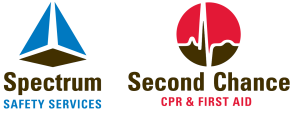 Spectrum Safety Services
Spectrum Safety Services  In Person
In Person  30-45 minutes
30-45 minutes
Spectrum Safety Services offers both Qualitative and Quantitative FIT Testing. See descriptions below for explanation on each type of FIT test.
Who requires FIT testing? People who are required to wear tight fitting respiratory protection and who work in conditions where they may be exposed to particulate (dust, mist, fume, fiber) and non-particulate (vapor or gas) contaminants.
We can fit test most manufactures including but not limited to Scott, North, MSA & 3M. Please ensure you request the appropriate makes and models of respirators as well as the appropriate test for your requirements.
Group bookings are welcome any time. Send us a quote request or contact us to discuss setting up a FIT Test for your group!
Length of Test: 30-45 minutes per respirator (varies)
Certification
- Spectrum Safety Services
- Complies with Industry and Workplace Health & Safety Standards
- Valid for 2 years (yearly testing recommended)
Preparing For Your FIT Test
- Participants must arrive clean shaven (mustaches are OK).
- Participants should ensure they do not smoke, eat or drink anything other than water 20-30 minutes before being FIT Tested.
- Please advise in advance if masks and or cartridges are to be purchased at the time of the test.
TEST Outline
- Donning / Doffing Respirators
- Sensitivity Test
- Qualitative Test
- Series of Six Exercises (normal breathing, deep breathing, head up and down, head side to side, talking, exerted breathing)
Qualitative FIT Testing (Hood)
A Qualitative FIT Test is a pass/fail test that relies on the participant’s response to a test agent (saccharin, isoamyl acetate (banana oil) and Bitrex).
The participant dons the respirator and a fit test hood. The test aerosol (saccharin or Bitrex) is sprayed inside the hood while the participant performs prescribed exercises. If the participant can taste the test agent, the respirator fails the test and another respirator must be tested.
Quantitative FIT Testing (PortaCount Machine)
A Quantitative FIT Test measures the adequacy of a respirator’s fit by numerically measuring the amount of leakage into the respirator.
The PortaCount works by measuring the concentration of microscopic dust particles in the ambient air and then measuring the concentration of those dust particles that leak into the respirator. The ratio of these two concentrations is called the FIT Factor. The filters stop essentially all the particles so anything that gets into the mask must have come through the face seal. A Quantitative FIT Test is not affected by the person’s sense of smell, taste or sensitivity to irritant chemicals.
Learn more about how you can advance your career with our certifications
Fill our the contact form and our education specialists will get back to you within 1-2 business days.
Or check our Frequently Asked Questions here.
[gravityform id="4" title="true"]
